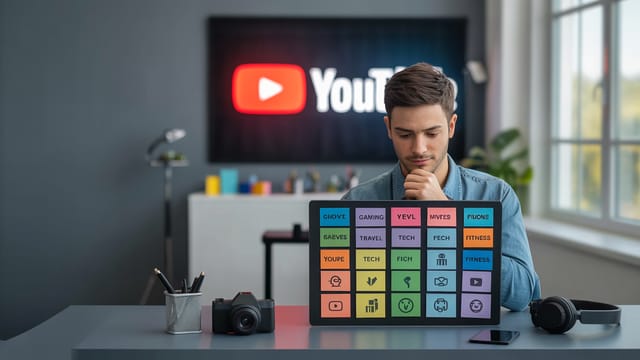
Ready to get your next 10,000 subscribers?
Join thousands of creators who use Subscribr to create faster, better YouTube videos.
Ethical Monetization on YouTube: Building Trust & Income
Monetizing your YouTube channel is a significant step, but navigating the path to income while maintaining your audience's trust can feel like walking a tightrope. For policy-conscious creators, staying ethical isn't just about following rules; it's about building a sustainable brand reputation and fostering a loyal community. In an ever-evolving digital landscape, especially with the rise of AI, understanding how to monetize ethically is more crucial than ever.
Many creators grapple with finding and implementing monetization methods that align with YouTube's guidelines while also feeling authentic. Keeping up-to-date with frequently evolving monetization policies adds another layer of complexity. This article will guide you through the essentials of ethical YouTube monetization, ensuring you can grow your income without sacrificing your integrity or your audience's trust.
Navigating YouTube's Monetization Policies: The Foundation of Trust
At its core, ethical monetization on YouTube starts with understanding and adhering to the platform's own rules. YouTube has clear guidelines regarding what types of content can be monetized, as well as specific requirements for disclosing paid promotions, sponsorships, and product placements. These policies are designed to protect viewers and maintain a fair and transparent ecosystem.
Familiarize yourself with the YouTube Partner Program policies, community guidelines, and importantly, the advertising policies. Pay close attention to sections on misleading metadata, spam, deceptive practices, and transparency. While these documents can be dense, they are your first line of defense against potential issues and provide the framework for ethical conduct.
Staying current with policy updates is an ongoing responsibility. YouTube periodically revises its terms, often in response to changes in the digital landscape, regulatory requirements (like FTC guidelines), or feedback from the community. Make it a habit to review official communications from YouTube and consult reliable creator resources to stay informed.
Ethical Disclosure: Sponsored Content and Paid Promotions
One of the most critical aspects of ethical monetization is transparently disclosing when you've been compensated to promote something. This isn't just a best practice; it's a legal requirement in many regions, including under the U.S. Federal Trade Commission (FTC) guidelines, which often apply to YouTube creators even outside the U.S. because of YouTube's base and global audience.
How to Ethically Disclose Sponsored Content:
- Use YouTube's Built-in Disclosure: YouTube provides a checkbox in the video details section specifically for indicating that your video "includes paid promotion like a paid product placement, sponsorship or endorsement." Always use this feature when a brand has paid you (money or free product/service) to feature their product or message in your video. This triggers a text overlay on the video at the beginning, informing viewers of the paid promotion.
- Verbal Disclosure: In addition to the on-screen notification, verbally disclose the sponsorship early in your video. A simple statement like "This video is sponsored by [Brand Name]" or "Thanks to [Brand Name] for supporting this video" is clear and effective. This ensures viewers who might miss the on-screen text are still informed.
- Written Disclosure: Include a clear written disclosure in your video description. Place it prominently, ideally near the top. Phrases like "#ad," "#sponsored," or "This video is a paid promotion for [Brand Name]" are standard and easily understood. Avoid burying disclosures at the very bottom of long descriptions.
- Be Genuine: Only promote products or services you genuinely believe in and would use yourself. As wisdom from creator strategy suggests, never sell a product you wouldn't buy. Your audience trusts your recommendations, and promoting something solely for the money, especially if it doesn't align with your values or audience needs, can severely damage that trust. Evaluating opportunities based on your values is key.
Explicit endorsements for products you genuinely use are crucial. An implicit endorsement carries the same risk to your credibility if the product proves unreliable. Listen actively to audience feedback regarding sponsors; if concerns arise, investigate and be willing to end partnerships that don't align with your values or audience expectations.
Affiliate Marketing Ethics and Disclosure
Affiliate marketing, where you earn a commission on sales made through your unique links, is another popular monetization method. While you are not directly paid by a brand for the video itself (as in a sponsorship), you are still compensated for driving a sale or lead. Therefore, transparency is equally vital.
YouTube's Guidelines on Affiliate Link Disclosure:
While YouTube's specific "paid promotion" checkbox is generally not needed for standard affiliate links where you earn a commission on a sale, clear disclosure is still mandatory according to FTC guidelines and best practices for maintaining audience trust.
- Written Disclosure in Description: Always include a clear disclaimer in your video description stating that you are using affiliate links and may earn a commission if someone purchases through them. Place this disclosure above the links themselves. A statement like "Note: Some of the links below are affiliate links, meaning I may earn a commission if you click through and make a purchase, at no additional cost to you." is standard and effective.
- Verbal Disclosure (Best Practice): While not always legally required for every single mention, it is best practice to verbally mention in your video that links you are directing people to in the description are affiliate links, especially when discussing specific products.
- Promote What You Use and Trust: Just like sponsorships, only use and promote affiliate products that you genuinely use, trust, and can ethically endorse. Building and maintaining trust is paramount when doing affiliate marketing.
- Provide Value Beyond the Link: Create content that offers real value beyond just showcasing a product. Share your genuine experience, provide detailed reviews (including long-term updates for higher-ticket items), discuss pros and cons, and compare options. This demonstrates that your recommendation is based on genuine experience, not just the potential commission.
- Address Issues Transparently: If you previously recommended a product via an affiliate link and later discover significant issues with it, be transparent with your audience. Create content explaining the problems and, if necessary, remove the affiliate link. Protecting your community's interests over short-term sales builds immense long-term trust and loyalty.
Following these best practices for affiliate marketing, including legal compliance like FTC guidelines, even if outside the US, is crucial. Focus on creating valuable content that naturally leads to authentic product recommendations.
Building and Maintaining Audience Trust While Monetizing
Monetization should enhance, not erode, the relationship you have with your viewers. Trust is your most valuable asset as a creator. To build and maintain it alongside income streams:
- Play the Long Game: Never sacrifice long-term audience relationships for short-term revenue from a sponsor or affiliate sale. A single deceptive promotion can cost you years of built-up trust.
- Be Selective: Carefully evaluate every monetization opportunity. Does it align with your channel's niche, values, and audience demographics? Is the product or service genuinely beneficial to your viewers? If it feels like a poor fit, or if you have doubts about the product's quality or the company's ethics, it's okay to say no, even to lucrative offers.
- Prioritize Your Own Products/Services: If you have your own products, merchandise, or services, consider prioritizing promoting them. You have full control over their quality and the customer experience, and you inherently believe in them.
- Avoid Over-Monetization: Bombarding your audience with too many ads, sponsorships, or affiliate pitches can lead to viewer fatigue and a feeling that you're "selling out." Find a balance that feels comfortable and authentic to your content style. Over-monetization can make your promotions less effective because your audience becomes desensitized.
- Engage and Listen: Pay attention to comments and feedback regarding your monetized content. Are viewers expressing skepticism? Are they reporting negative experiences with a product you recommended? Engage with these comments constructively and be willing to adjust your strategy or partnerships based on genuine audience concerns.
Ethical Monetization in the Age of AI
The increasing integration of AI into content creation brings new ethical considerations for monetization. While AI can be a powerful tool, its use requires transparency to maintain audience trust and navigate potential copyright and disclosure issues.
When using AI for tasks like scriptwriting, video editing, voiceovers, or even generating visual elements, consider:
- Disclosure of AI Assistance: While not always a strict legal requirement for basic AI editing, disclosing the use of AI, especially when it significantly impacts the content (e.g., AI-generated voiceovers, AI-written scripts on sensitive topics), can build transparency with your audience. Explain how you used AI and why, framing it as a tool to enhance your content rather than replace your authentic voice entirely.
- Copyright and Licensing: Ensure that any AI tools or assets you use comply with copyright laws. Understand the terms of service for AI platforms – who owns the output? Can it be used commercially? Are there potential issues with the data the AI was trained on?
- Maintaining Authenticity: AI can help with efficiency, but your audience connects with you. Ensure that AI-assisted content still reflects your unique voice, perspective, and values. Don't let the AI create content that feels inauthentic or compromises the trust you've built.
- Accuracy and Responsibility: If using AI to generate information or scripts, fact-check rigorously. You are ultimately responsible for the content you publish, regardless of how it was created. Avoid using AI to create misleading or deceptive content, especially when promoting products or services.
Navigating the ethics of AI in monetization is an evolving area. Prioritizing transparency about your process and ensuring AI is used responsibly to enhance, not deceive, will be key to maintaining trust.
Finding and Implementing Ethical and Sustainable Monetization Methods
Beyond sponsorships and affiliate marketing, numerous other monetization methods exist on YouTube, including AdSense revenue, channel memberships, merchandise shelves, Super Chat/Stickers, and more. The key to ethical and sustainable monetization is to:
- Diversify: Relying on a single income stream makes you vulnerable. Explore multiple methods that fit your content and audience.
- Align with Your Audience: Choose methods that resonate with your specific community. Channel memberships might work well for highly engaged audiences seeking exclusive content, while merchandise is great if your brand has strong visual identity.
- Provide Value: Every monetization method should offer value to your audience, whether it's entertaining content (AdSense), exclusive perks (memberships), or useful products (merch/affiliate).
- Be Transparent (Always): Regardless of the method, maintain transparency about how your channel is funded. This builds audience understanding and support.
Finding and implementing ethical and sustainable monetization methods that align with YouTube's guidelines requires a creator to understand their values, their audience, and the platform's rules. It's a continuous process of learning, adapting, and prioritizing the long-term relationship with your viewers.
Tools & Resources
Managing a YouTube channel, creating content, and navigating monetization ethics can be complex. Tools designed specifically for creators can help streamline these processes. Platforms like Subscribr offer features that assist with channel analytics, competitive research, script writing, and content planning, helping creators make data-driven decisions about their content and strategy. While Subscribr's primary focus isn't directly on compliance checks, understanding channel performance and audience engagement through its analytics can indirectly inform ethical considerations by highlighting what resonates genuinely with your viewers.
Conclusion
Ethical monetization on YouTube isn't a barrier to success; it's the bedrock of a sustainable and respected channel. By prioritizing transparency in sponsored content and affiliate marketing, promoting only what you genuinely believe in, building and maintaining audience trust, and navigating the ethical considerations of AI, creators can build a loyal community and generate income responsibly.
Staying informed about YouTube's policies and regulatory guidelines is an ongoing commitment. By making ethical practices a cornerstone of your monetization strategy, you not only protect your channel but also enhance your brand reputation, fostering a community built on trust and authenticity.





